

 |
Memoirs of Survival by the Now-deceased Classmates |
 |
| Foreword | ||
| On August 6, 1945, 309 first year students
of the First Prefectural Middle School were exposed to the A-bombing at school. Among those who had survived the catastrophe just after the A-bombing, only 19 students returned to school the next year. Soon after their return to school, the surviving students wrote about how they escaped. Their memoirs were edited in a booklet, "Memoirs of the Flight from Our Collapsed School." Later, some of them began to suffer from the later disorders of the A-bomb radiation. From 1949, five years after the A-bomb, until now, as many as ten survivors died of leukemia or cancer, which is extremely regrettable. On behalf of those classmates, who can't say any more, we decided to introduce some of their memoirs on our homepage. They vividly depict how tragic the A-bomb was. |
||
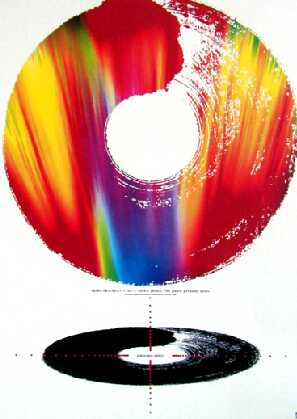 |
Memoir of Mr. Mita | 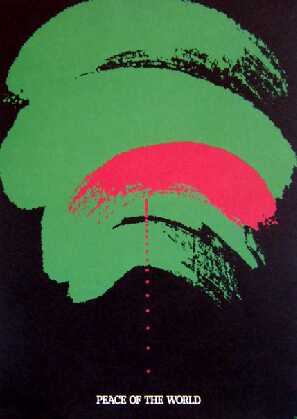 |
|||
| Memoir of Mr. Uehara | |||||
| Memoir of Mr. Harada | |||||
| Memoir of Mr. Kamioka | |||||
| Memoir of Mr. Fujino | |||||
| Memoir of Mr. Okamoto |
| Memoir of Mr. Mita | ||||
| Mr. Mita died just before his graduation
from Hiroshima University in the spring of
1955. A newspaper said that he was the first victim of the A-bombing in l955. Here is his written memoir about how he escaped. |
||||
・・・・・That detestable bomb was dropped. However, I had no memory about when it was dropped or how the scenery changed. When I came to, I was surrounded by flames, and I thought I had only a ten to one possibility to survive. At the time, I was completely confused in a daze, and I lost energy to walk on my own. I couldn't do anything except wait for death. I chose places which hadn't caught fire, snuck between trees and was prepared to face the damnable flames. Soon, however, I fell down and lost my consciousness. When I came to, I found the flames above me, and it was so hot that I felt as if my whole body was burning. Because of the heat, my decision crumbled. Then I tried to escape with all my force, evading the flames and wandering here and there unconsciously. However it was in vain, and my life looked like it was hanging on a thread. I had no way to escape and writhed in unbearable heat. Then, some idea flashed in my mind. I can't explain what kind of psychological situation I was in. Without any certainty, I staggered to the left side and found an emergency cistern. This water cistern saved my life. However, I was still in danger. Broken tin roofs, roof tiles, big wood pieces were whirling in the air like leaves and, moreover, I was surrounded by flames. Hitting around the water tank near me, five or six broken tin roofs were blown away somewhere, rattling. Anyway, I survived. The next morning, two senior students found me and took me to the First Middle School dormitory. During that time my consciousness seemed to be wandering between normal and abnormal condition. Later that noon, my cousin came from Saijo to take me to the Hiroshima Red Cross Hospital. The next day, some relatives took me back to Saijo. After three days, I returned to my familiar home on a stretcher. It was followed by another seven months of new sufferings.・・・・・ |
||||
He kept struggling with illness, suffering from hair loss and high fever as well as serious burns on his face. Finally he came back to school the next spring. He closed this memoir with gratitude to his good luck and the support from other people. |
||||
| Memoir of Mr. Uehara | ||||
| Mr. Uehara, a classmate, worked as a technical
officer of the Self Defense Forces for several
years after graduating from Hiroshima University,
and then took over his father's company.
However, he vomited a lot of blood and died
in 1980. Part of his memoirs reads as follows: |
||||
・・・・・After finishing the morning meeting, the odd number classes went to work at once, and the even number classes, including ours, went into our classrooms to rest. Some of the classmates were reading books and some were cooling their water bottles with well water. After a while, someone came to tell us that the duty would be soon shifted to our class. A few classmates were looking out of the windows to see a B-29 which was again flying overhead. The students of Class 14 bundled out of the room. The booming sound was heard for several minutes. For an instant, I felt as if a light flashed around the front door of the classroom. Suddenly it became bright yellowish white, and I felt a warm pressure. Although I was standing with my back to the front door, I felt as if I had been exposed to the light with my body toward the front door. I may have turned to the front door, getting exposed to the light the other way around. However hard I may think, I cannot say what my position was at that time. The next moment, it was pitch dark and nothing could be heard. Others said they had heard a thud of explosion, but I did not hear anything. My parents' faces passed by in front of me. I thought for a moment that I was dying. Without knowing what I was doing, I struggled instinctively. Then I became freer. Right in front of me, there was something like a tree, and I could manage to wriggle out by holding on to it. I could not see anything and I could not tell what anything was at all. After a while, broken pieces of houses came falling with noises. I wandered around. I saw a friend on the way. Both of us went to the East Drill Grounds. On the way there, I vomited dark-colored blood. I was intolerably sick and crouched down. I lost sight of my friend. I went up a hill and slept there. I was trying to go home in Ushita, crawling, and on the way, around 3 o'clock I came across my father, who was an officer. I was pleased. I had been so sick that it was difficult for me to voice even a word, but all of sudden on seeing my father, I began to feel better. From around the 20th on, I started to have a fever, and my two-month hospital life started. Thinking over now, what happened that day was beyond imagination.・・・・・ |
||||
| Memoir of Mr. Harada | ||||
| Mr. Harada succeeded his family business
in Hiroshima after he graduated from Doshisha
University. His shop was located in Hondori,
the downtown shopping area of Hiroshima,
which couldn't be more convenient as our
group's information exchange base. He was
working actively as a key member of the group. In the fall of 1975, 30 years after the A-bombing, regrettably he died of lung cancer, leaving his wife and children behind. It was a great blow to us, too. He may have left more notes on his terrible experiences, but here I'll introduce a piece he wrote when he was in middle school. |
||||
・・・・・A sudden flash was followed by a boom. At the same moment, the school building collapsed with an enormous rattle. Simultaneously, I lowered myself between the desks. Dirt filled my mouth. When I came to, my mouth was filled with mud. I first thought that only our school, the First Middle School, was bombarded, but I was wrong. Everybody was crying for help. I, too, cried loudly, but realized it was not much help. I looked for a hole to crawl out of the desks. Then I saw a dim light and moved toward it crawling. It was a little opening of the broken wall, but too small to get through. I broke the wall in desperation and got out. It was darker than a moonlit night outside. Fifteen or sixteen classmates, who had gotten themselves out, were trying to rescue other classmates, so I joined them. One was already dead with a fatal cut in his neck, and others were barely alive. It was a living hell on earth, indeed. Fortunately, I was not injured, probably because the window glass had been removed. The school building had only its framework left, with the roof tiles and everything having been blown off. Townspeople and students who had gone for labor service began to appear from nowhere with burns all over, completely naked or only with their underwear pants. Before long, a small fire like a bonfire started to break out every 10 square meters or so. Threatened by the fire, my friends and I tried to flee toward the main gate, but the fire was too strong. So we made a round by the swimming pool, passing straight by the fire and through the graveyard, and came to a ditch about three meters wide. We saw many girl students under the poplar tree of our school grounds who had fled from some school. The ditch was filled with many burned people. A crazy cow came dashing toward us. We were desperate to escape and made it to a large street that led to Hijiyama Bridge. Flames were shooting out of the building windows. There were mothers shouting in search of their children, and there were people who passed by yelling something. We ran and ran through the fallen houses and electric polls, and got to the Army Telegraphic Communication Corps Building in Hijiyama. There, we had some water from a soldier. Since I had a headache, I cooled my head. Noon came. I lingered there resting myself until around four o'clock, and then moved on to Hiroshima Station. I wanted to go home, but fires hampered me. One of my friends had an aunt living in Toyota-gun, so we decided to go there. We took a bus from Hiroshima Station to Kaitaichi, from where we went to Hongo by train. On the way I vomited in the train. After one week or so, I returned to Hiroshima and went to the burned ruins of my house, where I got information about my parents' whereabouts. I went to join my parents. About a week after that, A-bomb disease began to affect me, but I survived fortunately. I believe I was saved thanks to my parents' tender care and the fact that lots of ice was available. Also, I had a doctor visit every day and was given the necessary treatment including shots.・・・・・ |
||||
| The following note about the A-bombing and war was written 25-plus years after this memoir had been written, when he was in the prime time of his life, both work and health. | ||||
・・・・・I now realize that human thoughts are apt to change easily. I resolutely thought in those days that I would gladly sacrifice myself, since I believed peace would never come unless we defeated the evil enemy. Then I came to think that I would oppose war at all costs. I witnessed scenes where people were terribly burned and died in agony crying for water, and thought this was war, and war should never be fought again. Now I find it difficult to resist the temptation for pleasure as I tend to forget such detestable memories of war and the A-bombing. However, now that the memory of the A-bombing is fading and the sufferings of war and inhumane facts are being forgotten, I am uneasy and preoccupied by the thought that human beings might repeat the mistakes.・・・・・ |
||||
| A few years after this note was written,
Harada succumbed to the after-effects of
the A-bombing and passed away. It was regrettable, indeed. |
||||
| Memoir of Mr. Kamioka | ||||
| After graduating from the Tokyo National
University of Fine Arts and Music, Mr. Kamioka
was enjoying his career as a graphic designer
and a professor in an art college. Then he
developed cancer in the jaw, but he got over
it, thanks to a successful surgery. After
that he kept going with extraordinary vitality
even though he sometimes felt ill. Unfortunately, however, he died of lung cancer in 1997, 52 years after his exposure to the A-bomb. He contributed his memoir to the anthology of A-bombed children, "Children of Hiroshima" edited by Arata Osada, when he was a third year high school student, and as a graphic designer he created a lot of works on the theme of peace. Here is a note which he wrote when he was a middle school student, not long after the A-bombing, about how he had fled for life from the A-bombed city. |
||||
・・・・・The air raid warning was called off, but I heard the roar of a B-29 bomber. Some students didn't seem to care about it because they thought it might be just another passing B-29. Others went out of the classroom to the corridor to watch the bomber. The moment the airplane roar became faint, I saw a weird bright red flash of light, which seemed like burning celluloid. The next moment we were all buried under the toppled school building. I fainted momentarily in a strong smell like burning sulfur, with lumber and desks over my back, feeling wall mud and roof tiles falling over us. But I quickly came to, probably because I was too upset. Then I crawled out of the debris toward the light ahead of me. I reached the willow in the school grounds, amid groans and howls of death agony. Upon looking at me, my schoolmates Mr. Okada, Mr. Iwata and other students, who were uninjured like me, started to recite the Imperial Rescript for Servicemen, shouting "Let's recite the Imperial Rescript!" We recited it gravely with the full depth of our voices. Other students coming out of the debris one after another, joined us and started reciting it lively. In a while, the smell became stronger. We covered our noses and mouths with towels and moved to the school swimming pool's deck. On the way, we heard some students crying, "Help!," "Damn, damn!," "Have a never-give-up spirit!" from under the debris in the area of Class 5 or Class 6 rooms. Answering them, "We are going to the main building and get you some teachers!" we rushed to the teachers' office, which was in the main building. However, alas, not only the main building but the entire First Middle School, our beloved school, was completely flattened as far as I could see. When I went up onto the swimming pool deck to look over our school, I found a fire rising up at the northern end of the school premises where the building with our history room was. The fire was spreading very quickly. Then I happened to turn my eyes to my side and found Mr. Mimura of Class 14 shouting in tears, "Banzai! Banzai!" He didn't seem to notice his shirt and pants were burning. I quickly soaked my hand towel in the swimming pool water and put out the fire on him with it. Mr. Suzuki of Class 16, one of my neighbors I usually played with, was burned over his entire body. His eyes were terribly damaged, and his skin was hanging from his arms like sleeves of a Japanese kimono. He was murmuring, "I can't see anything." Mr. Kato of Class 14 was badly injured in the head and legs. Although blood was gushing from his wounds, he dauntlessly applied his gaiters to them to stop the bleeding. Those of us who were all right and able to walk decided to just flee for safety. Leaving the swimming pool deck and going through the graveyard behind the school, we ran toward Hijiyama Bridge. On our way we ran into Mr. Kawanaka our P.E. teacher, who had been at the building demolishing work site. His entire body was covered with burns, and his shirt and pants were burned and hanging down from his body. I saw Jogakuin Girls' School students, who had been working at the same work site as First Middle School students. Their entire bodies were also covered with burns, and their hair and clothes were totally burned, too. Mr. Taue, and Mr. Nagoshi of Class 13 and I lost sight of Mr. Kawanaka and other schoolmates on the way to Hijiyama. Most of the students ran away from the swimming pool toward Hijiyama, because Hijiyama looked safe without any flames, while Kamiya-cho and Takanobashi were enveloped in flames. Both Mr. Taue and Mr. Nagoshi were burned over their entire bodies and lost their eyesight. So I gave them each my shoulder and we just kept walking toward Ujina after crossing Hijiyama Bridge. I started to feel terribly sick because of some gasses. I threw up many times and had difficulty in walking. Then, a truck came to us from behind and we were told to hop on. We were in seventh heaven and gratefully hopped on board the truck. We all collapsed once we were on the truck. I vomited again. We were brought to the Army Mutual Aid Hospital in front of Koryo Middle School in Ujina. Mr. Taue and Mr. Nagoshi, who were heavily burned, were quickly sent to the treatment room, and I was taken by a nurse to the air-raid shelter to rest because I didn't have any more strength to walk. The shelter was filled with groans. I saw a child who looked more dead than alive with his intestines burst out of his stomach, a man whose face was burned beyond recognition, and a woman who looked lifeless having lost her arm. After some rest, I wanted to see how my two friends were. So I went out of the shelter leaning on a stick. There was a rumble of a B-29 in the sky. This hospital seemed to be the only one to have barely survived the bombing. When I looked toward Takanobashi, I could see nothing but fire and smoke. My two friends weren't to be found anywhere in the hospital. In the hospital I saw Mr. Sugita, who was a son of my former teacher. He didn't appear injured, like me. He said he had just been hit on the lower back very hard, but he looked comparatively all right, better than me. Around four in the afternoon, I recall, I left the hospital with the stick. I decided to hurry home. On the way, I had to jump into a fire prevention cistern several times near Takanobashi and near Meiji Bridge. Reaching Sumiyoshi Bridge, I looked over toward my house. When I saw a sea of fire there, I gave up the idea of going home. Then I decided to go to Rakurakuen, where my grandmother had been evacuated. Wrapping rice balls and potatoes, which I was given at the hospital earlier, in my hand towel, I hurried toward Koi. I saw many people fleeing toward Koi. Among them, I saw a woman burned over her entire body, carrying a baby covered with blood, and a man completely naked staggering with a stick. Those people were all walking ploddingly without their shoes, with hair singed and disheveled, with burns all over their bodies, and naked. It was truly horrible to see them. I was given a lot of sea biscuits at Koi Station of the Miyajima Line. Wrapping them in the towel together with the rice balls, I hurried on my way to Rakurakuen. Because the streetcars had stopped running, people fled toward Miyajima on foot. Around 8:30 p.m., I got as far as Itsukaichi Town Hall. There I found people lying on straw mats. It seemed that they would spend the night, having no place to flee to. After taking a rest there I set out again. My grandmother was very surprised to see me when I arrived at the house where she had been evacuated. I told her that our house had gone up in flames. She grieved that my family must have died. Please rest in peace, my teachers, my friends, and innumerable people killed in Hiroshima.・・・ |
||||
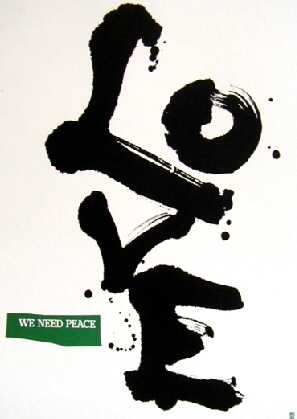 |
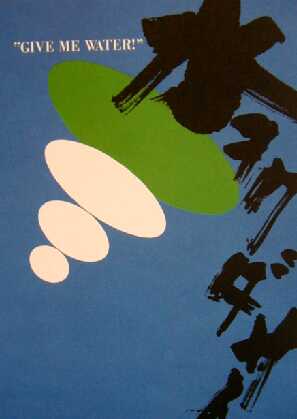 |
|||
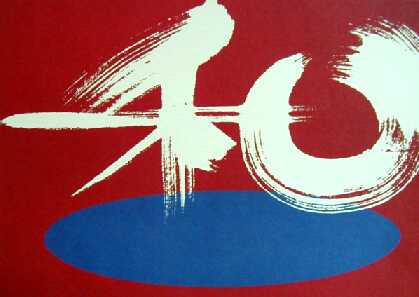 Mr. Kamioka's "Love Peace" posters Mr. Kamioka's "Love Peace" posters |
||||
| Memoir of Mr. Fujino | ||||
| After he graduated from Kansai University,
Mr. Fujino, a classmate, worked for the Hiroshima
Prefectural office for a long time. However,
after he retired, he died of cancer. This is the note of how he escaped from the A-bombing at that time, written when he attended middle school. |
||||
・・・・・When I was waiting for my turn for work, I heard an air-raid warning. It soon cleared, but I thought I still heard the sounds of aircraft. Very soon after, a very bright yellow light flashed, and I lost consciousness. When I came to, it was too dark to understand what had happened and too painful for me to open my eyes. I had a strange taste in my mouth, probably because of some dirt. I stayed where I was. After a while, feeling nothing, when I looked around I found a small hole. Sitting on a desk, I dragged my body, which was leaning at a 45-degree angle, toward the hole. Then I finally managed to get out. There were about 20 or 30 people outside. However it was still quite dark and I couldn't do anything. I helped my classmates. When I went to the swimming pool, I saw many people who had been working outside. Most of them were badly burned on the upper part of their bodies and burned skin was hanging from them. As the sky got a little lighter, one of my friends and I escaped from the back of the school to Hijiyama Hill. When we arrived at Hijiyama Hill, it was already light. Fires broke out here and there. As my friend had a serious injury on his head, I put gaiters on it. I was unhurt and well then, but a little later I started throwing up the food I had eaten that morning. I felt my energy draining away. We encouraged each other and kept walking with an occasional stop for a break. We became so weak that we could only walk a couple of meters at that time, however we kept walking and staggering away from the center of the blast. I vomited as soon as I drank some water. Finally I threw up yellow fluid. While I was lying down, someone from Niho, who was on a bicycle, came up to me. "Aren't you a student of the First Middle School?" he asked. "You shouldn't be here." he said. He then took me to his home on his bicycle. I vomited everything I had eaten in his house; I could not help it. His family informed my family in Aki-Nakano about me. My mother came for me and we went home in a car. When I arrived home, I could stand a little better. I was slowly getting better. By the 15th of August, I could walk around the house. On the evening of the 17th or 18th of August, I realized I was losing my hair. I wondered why. I washed it, but it got worse. When I touched my head, it came out. The next day, I had a fever of 39?, which continued for about fifteen days. Sometimes it rose over 40?. While I had a fever, I had injections three times a day from a doctor, who was one of my relatives. I couldn't eat anything and did not know what was happening to me at that time. When my fever went down to about 38?, my injections were reduced to twice a day, which remained until February. In January, I became well enough to walk around the house again. In the middle of February, I went back to school. No one, including my doctor and family, thought I would survive. The person from Niho who helped me was looking for his child, who was in the same grade as me, a first year student. When he found me, he was on his way back home alone.・・・・・ |
||||
| Memoir of Mr. Okamoto | ||||
| Mr. Okamoto, a classmate, passed away of
cancer in 1995, fifty years after the A-bombing.
Let me introduce his memoir, which describes how he escaped from the collapsed buildings of First Middle School |
||||
・・・・・The memory of unspeakable and ferocious August 6th, 1945 will burn into our minds forever. I left home by bike and then took a streetcar to school as usual. We were kept busy, cleaning up the demolished houses those days. Class 11, 13 and 15, out of the six classes from Class 11 to 16, went to the demolition site, and the rest of the classes stayed at school. Some were reading books, and others were messing around. After a while, the City gave an air-raid warning. Until then, it had been just like any other day. Then, we heard the sound of B-29s. Some of us tried to go out to see the planes. I was leaving my desk. At that moment, a flash burst. Seeing that yellowish flash, I lost consciousness at the corner of the classroom. I didn't know what happened after that. When I came to, it was dark around me. I felt suffocated with something weighing heavily on my back. It was very quiet, and I heard buzzing in my ears. Then, the buzzing was drowned out by a voice of "Help!," which made me realize a classmate was under me. "It was an air-raid. We were finally attacked. I'm dying here." I was bitterly chagrined, feeling like there was no turning back anymore. A classmate was crying out frantically, "Help!" Another classmate started singing Japan's national anthem, "Kimigayo." Mr. Ito, a classmate, and I were cheering up each other, waiting for someone to come rescue us. Then we heard something spluttering. Attempting to get out, we moved our bodies little by little, and we were so happy when we finally saw a faint light from a gap of ripped floor boards. Clawing our way to the light, we found a classmate leaning on a chair, bleeding from his neck, which dyed the soil under the floor dark red. He was making a croaking sound without moving an inch. We managed to get out of the debris with lots of scratches. Smoke and dust had grown dense outside. All of the roofs of our school buildings had fallen to the ground. Some students were bleeding from wounds. Others were just sitting in a daze with faces that didn't look like human beings. We rescued a few students out of the debris, but the time to leave there came. We fled, passing by people who looked as if they had been tormented by demons in hell. While climbing over roofs and gravestones and through flames to the street, we saw the most devastating, brutal sights in the human world. I can vividly recall our brave vice-principal pulling a wounded student on a two-wheeled cart. I was able to survive. I cannot help feeling sorry for our dead friends, although fate decided. We offer our heartfelt condolences to them.・・・・・ |
||||
| (English) |
